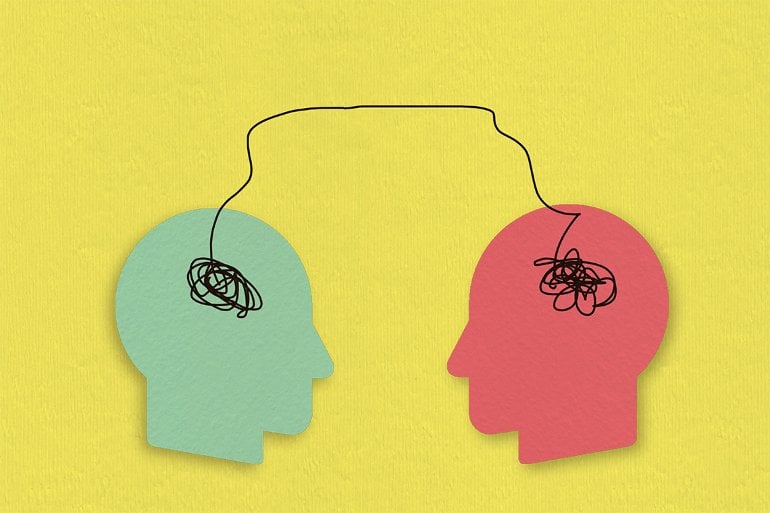(Neuroscience News) Researchers at the University of Toronto are studying our capacity for empathy, or our ability to sense and understand someone else’s emotions, and are debunking some common misconceptions along the way.
by Staff Writer, July 27th, 2021
Their work, recently published in the journal Psychological Science, is potentially important since empathy is fundamental to maintaining meaningful and healthy relationships, making it a big part of our daily lives.
“We want to get a description of empathy by looking at it in everyday life, across different emotions and social contexts,” says Greg Depow, a PhD student who is studying social psychology at U of T Scarborough.
“We want to study empathy more in environments closer to how it is actually experienced in real life.”
The study, which was co-authored with Professor Michael Inzlicht, looked at perceptions of empathy in 246 American adults. Depow says one goal of the research is to fill in gaps from previous work to offer a deeper, more authentic view of empathy. This was done by looking at who is more likely to be empathetic and how often we take the opportunity to empathize per day.
The research also looked at how empathy impacts subjective well-being, which is the scientific term for happiness and sense of purpose in life.
The researchers found that people will empathize when they recognize the opportunity to do so, but often notice other people’s emotions without flagging them as opportunities to empathize.
“People were seeing these emotional experiences of other people, but weren’t flagging them as opportunities to empathize,” Depow says. “If you crunch the numbers a bit, it seems as though a third of emotions people see in daily life are not seen as empathy opportunities.”
Learning what differentiates missed and flagged opportunities may be key to learning how to recognize and provide opportunities empathy more successfully, Depow says.
“One thing that I’m interested in is differentiating missed opportunities from the ones people are noticing. This is important because people may be missing opportunities to connect with others and promote happiness for both parties.”
While previous studies have typically focused on how empathy is measured based on the suffering of strangers and its effects on the empathizer, it turns out people are three times more likely to empathize with positive emotions than negative ones.

“If I look just at negative emotions that people are empathizing with, that’s actually associated with reduced subjective well-being,” Depow says. “[But] because people are empathizing with positive emotions three times as often, overall empathy is associated with increased subjective well-being.”
Who we empathize with is also an important factor. Most studies tend to focus on how people empathize with strangers, but Depow says the evidence shows that people are more likely to support those who are close to them.
“People find empathy difficult more or less in different situations and that seems to change people’s experience of empathy and the extent to which they empathize.”
The researchers also found that receiving empathy ourselves may make us more receptive to empathizing with others. By contrast, those who empathized with others were no more or less likely to notice another opportunity to empathize with someone else.
Funding: The research received support from the Social Science and Humanities Research Council of Canada.
About this empathy research news
Source: University of Toronto
Contact: Tina Adamopoulos – University of Toronto
Image: The image is credited to University of Toronto
Original Research: Closed access.
“The Experience of Empathy in Everyday Life” by Greg Depow et al. Psychological Science
Abstract
The Experience of Empathy in Everyday Life
We used experience sampling to examine perceptions of empathy in the everyday lives of a group of 246 U.S. adults who were quota sampled to represent the population on key demographics.
Participants reported an average of about nine opportunities to empathize per day; these experiences were positively associated with prosocial behavior, a relationship not found with trait measures.
Although much of the literature focuses on the distress of strangers, in everyday life, people mostly empathize with very close others, and they empathize with positive emotions 3 times as frequently as with negative emotions.
Although trait empathy was negatively associated only with well-being, empathy in daily life was generally associated with increased well-being.
Theoretically distinct components of empathy—emotion sharing, perspective taking, and compassion—typically co-occur in everyday empathy experiences.
Finally, empathy in everyday life was higher for women and the religious but not significantly lower for conservatives and the wealthy.
Stillness in the Storm Editor: Why did we post this?
Psychology is the study of the nature of mind. Philosophy is the use of that mind in life. Both are critically important to gain an understanding of as they are aspects of the self. All you do and experience will pass through these gateways of being. The preceding information provides an overview of this self-knowledge, offering points to consider that people often don’t take the time to contemplate. With the choice to gain self-awareness, one can begin to see how their being works. With the wisdom of self-awareness, one has the tools to master their being and life in general, bringing order to chaos through navigating challenges with the capacity for right action.
– Justin
Not sure how to make sense of this? Want to learn how to discern like a pro? Read this essential guide to discernment, analysis of claims, and understanding the truth in a world of deception: 4 Key Steps of Discernment – Advanced Truth-Seeking Tools.
Stillness in the Storm Editor’s note: Did you find a spelling error or grammatical mistake? Send an email to [email protected], with the error and suggested correction, along with the headline and url. Do you think this article needs an update? Or do you just have some feedback? Send us an email at [email protected]. Thank you for reading.
Source: https://neurosciencenews.com/empathy-life-18996/
Support our work! (Avoid Big Tech PayPal and Patreon)DIRECT DONATION


Leave a Reply